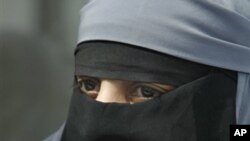French parliamentarians on Tuesday began debating a proposed law that would ban women from wearing the full Islamic veil in public places.
It is estimated that there are between 400 and 1,000 women in France who wear the niqab or burqa, which covers the face, leaving only the eyes exposed. But the proposal to ban the burqa is being debated across France.
The burqa is a loose fitting garment worn over a woman's clothes that covers her entire body, leaving only her hands and eyes exposed. The niqab is a face veil, usually worn with a burqa.
The French National Assembly is expected to spend the next two or three days debating the proposed legislation, which would ban full veil in public places.
At stake, say those behind the proposed legislation, is France's commitment to a secular society. And its commitment to equal rights for women.
Supporting the bill is the ruling Union for a Popular Movement, or UMP, several women's rights groups, and a number of Muslim clerics who say they are concerned by the growing number of fundamentalists in the French Islamic community.
Jean-Francois Copé, president of the parliamentary group of the UMP, is behind the bill. He says the full veil is an attack on the values of the French republic.
"I insist on the fact that there is no stigmatisation of the Muslim community," said Jean-Francois Copé. "As you know, the burqa is not at all a religious prescription. I would say it's extremists who are opposing [the values] of the Republic. And the best answer we have is to say that in France in public, you have to make your face visible. It's a way to respect each other and also a way to preserve security."
There are at least five million Muslims in France - the largest Muslim population in Europe. Six years ago, France banned the Islamic headscarf, as well as other religious symbols, from public schools and government buildings.
The proposed ban would fine women about $190 for wearing a niqab in public. Violators would also have to take a French citizenship course.
The penalty would be tougher for anyone found to have forced a woman to wear a full veil - a one year jail sentence and a $38,000 fine.
Some people who support the bill say many women wear the veil because they're forced to, not because they want to.
Sihem Habchi is president of the feminist organization Ni Putes Ni Soumises, or "Neither Whores nor Submissive," which supports the bill.
Habchi says this has nothing to do with Islam. She calls it an archaic, retrograde practice with regard to women. She says the issue has been used by what she termed "the Extreme Right" to create confusion.
But not everyone agrees that France or women are at risk. Several human rights groups are concerned that the law will affect Muslim women's right to dress as they wish.
A week ago, the European Parliament said it opposed laws prohibiting certain types of dress. Belgium is considering similar legislation to ban the burqa in public.
Analysts say the French bill is expected to pass. But the opposition Socialist Party has indicated it will abstain during the vote in the National Assembly, which is expected on July 13.
France Debates Public Ban on Full Islamic Veil
- By Elaine Cobbe











